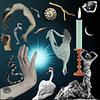Take a photo of a barcode or cover
Too overwhelmed by the density of certain passages; one review said there is satisfaction in indulging in meticulousness but I don't think I can say that as a reader of this book. Maybe if I wrote it I'd feel differently; I do love a good passion project. And I also feel a lot of this was stuff I've explored on different occasions even if not in the same contexts as a Bay Area wasian involved in elite academia and detached artistry.
This is not a book about digital minimalism. If you're looking for practical advice on spending less time on social media, find a different book.
Rather, this is an argument for and celebration of sustained attention, sustained activism, and bioregionalism. It's a high brow book in some ways - Odell has a fondness for big words and high concept - but what it connects to are things that any person can experience and feel: the way that our focus changes our reality, the way that paying attention to fine details gives us depth of satisfaction, the way that really immersing ourselves in a place makes individuals and systems apparent in ways we didn't know were possible. It's an excellent book, and well worth reading.
Rather, this is an argument for and celebration of sustained attention, sustained activism, and bioregionalism. It's a high brow book in some ways - Odell has a fondness for big words and high concept - but what it connects to are things that any person can experience and feel: the way that our focus changes our reality, the way that paying attention to fine details gives us depth of satisfaction, the way that really immersing ourselves in a place makes individuals and systems apparent in ways we didn't know were possible. It's an excellent book, and well worth reading.
hopeful
informative
inspiring
reflective
relaxing
slow-paced
Notice.
Be.
Root yourself in the here and now, while connecting yourself to the were and was. The world is bigger and smaller than you can imagine, but you can notice and learn about it.
Be.
Root yourself in the here and now, while connecting yourself to the were and was. The world is bigger and smaller than you can imagine, but you can notice and learn about it.
challenging
informative
slow-paced
informative
medium-paced
challenging
hopeful
informative
inspiring
reflective
slow-paced
informative
slow-paced
I liked the premise of the book and I respect the author’s philosophy a lot. However, I think the book felt more like 6 long essays than a cohesive argument.
What you must understand is this isn't a how-to manual on how to give up your phone and delete your social media accounts. Approach it that way and you'll absolutely learn something.
Jenny Odell comes from a place of privilege, much of which she acknowledges: she has a creative job with flexibility that doesn't leave her incredibly time-poor. She doesn't need to rely on social media to get or keep a job.
What she doesn't acknowledge is that she's privileged in having been educated in a way that guides her to things like bird-watching or attending conceptual art shows. We, too, can pick up esoteric hobbies, if we just put down our phones. What we choose to do with our freed time doesn't need to align with her interests; we just need to give it attention.
My issue is with her always privileging face-to-face contact. I get it; social media can disrupt actual connection. But it can create it as well, if you use it right. There's a middle ground where you're not always scrolling, your privacy settings are on, you have lists, you use private messages ... Yeah, there's still an element of Big Social trying to dictate our wants, and we should try to find alternatives. But it's a privilege to walk away, particularly for those who have disabilities, language issues, chronic pain or health problems, live far away from our families...
Overall, some great things to think about and take onboard--and probably more helpful than teaching a temporary "digital detox."
Jenny Odell comes from a place of privilege, much of which she acknowledges: she has a creative job with flexibility that doesn't leave her incredibly time-poor. She doesn't need to rely on social media to get or keep a job.
What she doesn't acknowledge is that she's privileged in having been educated in a way that guides her to things like bird-watching or attending conceptual art shows. We, too, can pick up esoteric hobbies, if we just put down our phones. What we choose to do with our freed time doesn't need to align with her interests; we just need to give it attention.
My issue is with her always privileging face-to-face contact. I get it; social media can disrupt actual connection. But it can create it as well, if you use it right. There's a middle ground where you're not always scrolling, your privacy settings are on, you have lists, you use private messages ... Yeah, there's still an element of Big Social trying to dictate our wants, and we should try to find alternatives. But it's a privilege to walk away, particularly for those who have disabilities, language issues, chronic pain or health problems, live far away from our families...
Overall, some great things to think about and take onboard--and probably more helpful than teaching a temporary "digital detox."
challenging
informative
reflective
slow-paced
emotional
hopeful
informative
reflective
medium-paced






